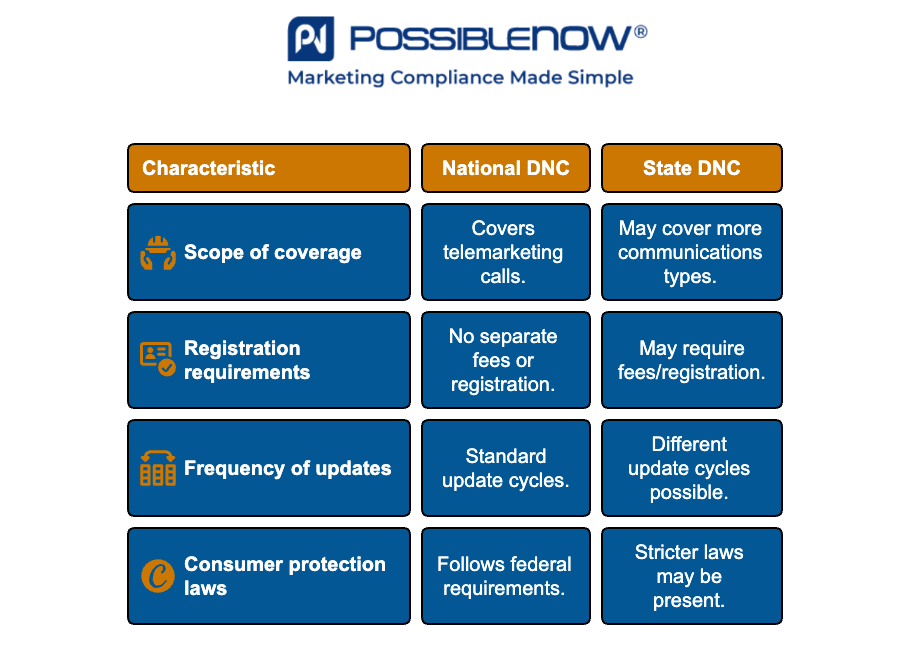Resource Center
What Is the Difference Between a State and National Do Not Call List?
Type: Blog
Topic: Do Not Call Solution

The National Do Not Call (DNC) List, managed by the Federal Trade Commission (FTC), is a centralized registry designed to prevent consumers from receiving unwanted telemarketing calls. However, many states also maintain their own Do Not Call lists, which have additional rules and regulations that businesses must follow. The key difference between the state and National DNC Lists is that state lists may impose stricter requirements and cover additional categories of communication beyond what the federal list mandates.
For businesses that operate across multiple states, complying with both state-specific regulations and the National DNC List can be challenging. That’s where PossibleNOW’s Do Not Call solution becomes crucial. DNCSolution helps businesses manage compliance with both state and national regulations, helping them avoid legal penalties while maintaining effective telemarketing operations.
ing sections, you’ll find information on:
Speak With an Expert Today
Key Differences Between State and National DNC Lists

The National DNC List is a federal initiative, applicable to all businesses making telemarketing calls within the United States. It allows consumers to register their phone numbers and prohibits telemarketers from calling those numbers unless they have express permission or an established business relationship .
Eleven states – including Indiana, Florida, and Colorado – have established their own DNC lists with additional requirements. The result is a patchwork of state and federal regulations that can make telemarketing campaigns difficult to manage without the right compliance tools. Companies must understand the regulations of each state where they operate to avoid violations.
State DNC lists can differ in several ways:
- Scope of coverage: Some states cover more types of communications, such as business-to-business calls or calls to mobile numbers, which may not be fully covered under the National DNC List.
- Registration requirements: States may require telemarketers to pay separate fees or register specifically to access their DNC lists.
- Frequency of updates: State DNC lists may have different update cycles compared to the national list, requiring businesses to scrub their call lists at different frequencies to stay compliant.
- Consumer protection laws: States may have stricter consumer protection laws that go beyond the requirements of the national DNC list, enforcing additional privacy safeguards or offering consumers more rights to opt out of marketing communications.
Penalties for Violating State vs. National DNC Regulations
Penalties for violating DNC regulations can be steep, whether on the national or state level. Under the national DNC rules, businesses can be fined over $40,0002 per call/text violation.
State penalties vary. Some states impose additional fines or allow consumers to bring lawsuits directly against telemarketers, which can increase the financial risk for businesses.
In addition to financial penalties, businesses that repeatedly violate DNC laws may face lawsuits, class-action litigation, and long-term damage to their reputation. Guaranteeing compliance with both state and national DNC rules is essential for avoiding these costly repercussions.
How DNCSolution Helps You Manage Both State and National Lists
PossibleNOW’s Do Not Call platform simplifies the complex process of managing both state and national DNC lists. DNCSolution automates the process of scrubbing contact lists, tracking consumer consent, and ensuring compliance with each state’s specific regulations.
With real-time updates and seamless integration into your existing CRM systems, DNCSolution helps businesses avoid costly penalties while maintaining compliance with both state and federal laws.
Request a Demo Today
About PossibleNOW
PossibleNOW is the pioneer and leader in customer consent, preference, and regulatory compliance solutions. We leverage our MyPreferences technology, processes, and services to enable relevant, trusted, and compliant customer interactions. Our platform empowers the collection, centralization, and distribution of customer communication consent and preferences across the
enterprise. DNCSolution addresses Do Not Contact regulations such as TCPA, CAN-SPAM and CASL, allowing companies to adhere to DNC requirements, backed by our 100% compliance guarantee.
PossibleNOW’s strategic consultants take a holistic approach, leveraging years of experience when creating strategic roadmaps, planning technology deployments, and designing customer interfaces. PossibleNOW is purpose-built to help large, complex organizations improve customer experiences and loyalty while mitigating compliance risk.
-
TCPA Regulations and Compliance: Complete Guide
Type: Blog
Topic: Do Not Call Solution
-
Defining Meaningful Metrics: 6 Soft KPIs to Measure Customer Preference Collection
Type: Blog
Topic: Preference Mgmt
-
Email Preference Center Best Practices
Type: Blog
Topic: Preference Mgmt
-
The Basics of DNC Scrubbing: What Is a Do Not Call (DNC) Scrubber and Why Do You Need It?
Type: Blog
Topic: Do Not Call Solution
-
What is Consent Management, How it Works, & Why it’s Important for Data Compliance
Type: Blog
Topic: Consent Mgmt
-
Do Insurance Companies Cover TCPA Damages?
Type: Blog
Topic: Do Not Call Solution
-
8 Best Practices for Capturing GDPR Consent
Type: Webinars
-
Data Silos Cause Communication Gaps
Type: Videos
Topic: Preference Mgmt
-
Difference Between Preferences & Consent
Type: Videos
Topic: Preference Mgmt
-
Integrate Do Not Call Compliance with Preferences
Type: Videos
Topic: Preference Mgmt
-
Customer Preferences Require More Than One Flavor
Type: Videos
Topic: Preference Mgmt
-
Give Customers Opt-Down Options
Type: Videos
Topic: Preference Mgmt
-
Preference Center Organization
Type: Videos
Topic: Preference Mgmt
-
Strategic Consultants Benefited Scotiabank
Type: Videos
Topic: Industry Testimonials
-
Best Practices for Managing Do Not Email Lists
Type: Blog
Topic: Do Not Call Solution
-
How Do Not Call Rules Apply to Nonprofit Organizations
Type: Blog
Topic: Do Not Call Solution
-
How to Train Your Call Center on DNC Rules
Type: Blog
Topic: Do Not Call Solution
